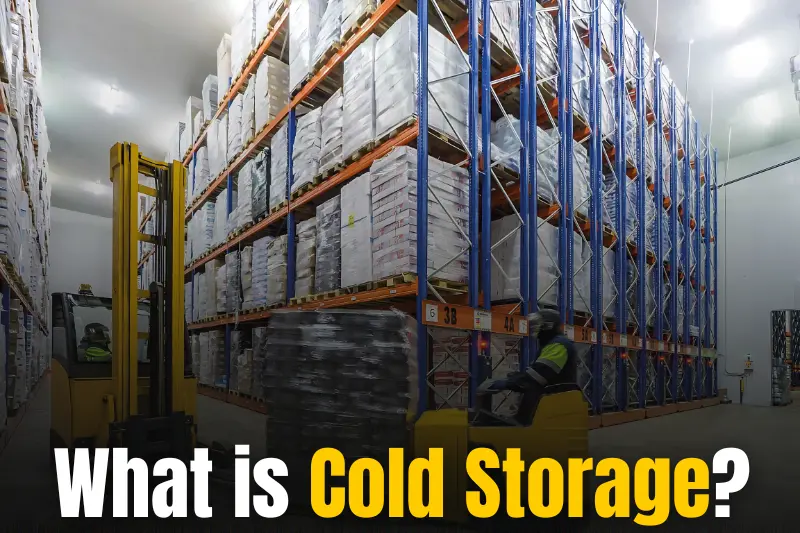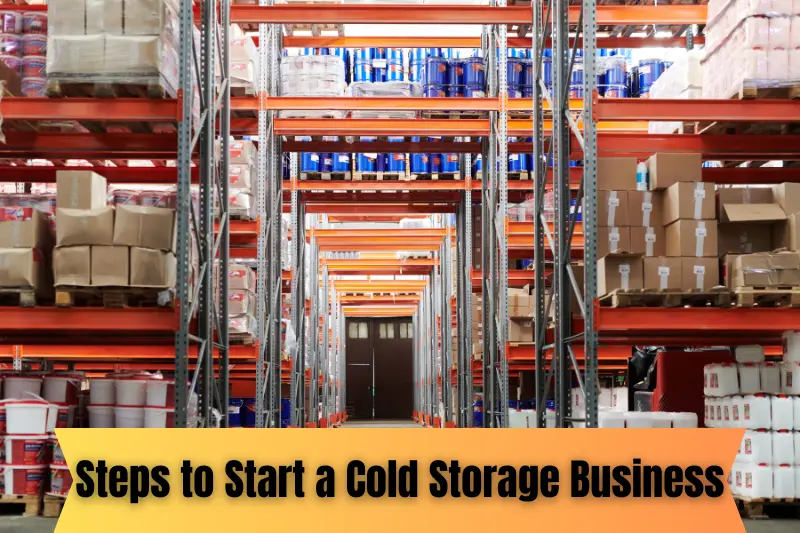Imagine walking into a massive warehouse with rows of refrigerated shelves, all stocked with everything from fresh vegetables to delicate pharmaceuticals. This is the world of cold storage, where temperature control is everything. In a world that depends on freshness, cold storage businesses play a crucial role in keeping products safe and preserved until they reach their destination.
Cold storage is a method of storing goods at low temperatures to maintain their quality and prevent spoilage. It is especially important in industries like food, pharmaceuticals, and chemicals, where maintaining freshness is critical. Cold storage businesses are in high demand as the need for fresh produce, perishable food items, and temperature-sensitive medicines continues to grow. The cold storage business ensures that these products are kept safe throughout transportation and storage, playing a vital role in global supply chains.
What is Cold Storage?

Cold storage is a method of keeping products at low temperatures to maintain their freshness and prevent spoilage. It’s like a giant fridge or freezer that is used to store goods that need to be kept cold or frozen for long periods.
- Cold storage helps keep perishable items safe until they are ready for use.
- It’s essential for industries dealing with food, pharmaceuticals, and chemicals.
- The temperature-controlled environment helps reduce waste and ensures product quality.
Types of Cold Storage
There are different types of cold storage, each serving a specific purpose depending on the product being stored.
- Refrigerated Warehouses:
These are large facilities that keep goods at temperatures just above freezing, ideal for fruits, vegetables, dairy, and other perishable items. - Deep-Freeze Storage:
This type of storage keeps items at extremely low temperatures, below freezing, and is commonly used for frozen foods, meats, and ice cream. - Cold Rooms/Walk-In Freezers:
These are smaller storage areas within a warehouse where products are kept at controlled temperatures, often used by retailers or smaller businesses.
Common Industries That Use Cold Storage
Cold storage plays a critical role in various industries that rely on maintaining product quality for extended periods.
- Food Industry:
Used to store fresh produce, meats, seafood, dairy products, and frozen foods, ensuring they remain safe for consumption. - Pharmaceuticals:
Many medicines, vaccines, and other health-related products require cold storage to maintain their effectiveness. - Chemicals and Cosmetics:
Certain chemicals and cosmetic products need to be stored in cold environments to prevent them from deteriorating or losing their quality.
Example:
“Think of cold storage as a giant fridge, but much bigger! It’s used to store things like frozen food or temperature-sensitive medicines.”
You may also like it:
Personal Finance Guide: Tips for Financial Success
Smart Home Trends: Top Innovations for 2025
Easy Budgeting Tips: Manage Your Money Smartly
Why Start a Cold Storage Business?
Starting a cold storage business offers several opportunities due to increasing demand across various sectors. Let’s take a look at the main reasons why cold storage is a growing industry.
Growing Market for Fresh Food and Pharmaceuticals
- As people demand more fresh produce and perishable items, the need for cold storage grows.
- Pharmaceuticals, including vaccines and temperature-sensitive medicines, require proper storage to maintain their effectiveness.
- The rise in consumer demand for organic and fresh products increases the need for efficient cold storage solutions.
Rising Demand for Longer Shelf Life of Products
- Advances in cold storage technology help extend the shelf life of perishable goods.
- Businesses in food production and pharmaceuticals are constantly looking for ways to preserve products for longer periods.
- Cold storage reduces waste and ensures products are available to consumers even after long storage times.
Increased Global Trade and Transportation of Perishable Goods
- Globalization has led to an increase in the transportation of perishable goods across long distances.
- Cold storage facilities are essential for maintaining the quality and safety of goods during transportation.
- International trade has created a need for cold storage businesses to support logistics in various industries, especially in food and pharmaceuticals.
Tip:
“If you’re looking for a business with steady demand, cold storage could be a smart choice as more people rely on fresh products.”
Steps to Start a Cold Storage Business

Starting a cold storage business involves several critical steps to ensure success. Below are the essential steps you need to take.
Research and Planning
Before starting, it’s important to fully understand the market and legal requirements.
- Market Research: Assess Local Demand and Competition
Conduct research to understand the demand for cold storage in your area. Check the number of competitors and their services to identify gaps you can fill. - Legal Requirements: Permits, Licenses, Health and Safety Regulations
Make sure to obtain the necessary permits and licenses to operate. Be aware of health and safety regulations related to temperature control and product storage.
Choosing the Right Location
The location of your cold storage facility is a critical decision.
- Proximity to Suppliers
Choose a location close to suppliers or the source of your goods to reduce transportation time and costs. - Access to Transportation Routes
Ensure the location is near major transportation routes like highways or ports to help with easy distribution and logistics. - Target Market Consideration
Think about where your target customers are located. Being near retailers or businesses that need cold storage can help you attract clients.
Choosing the Right Equipment
Selecting the proper equipment is crucial for maintaining the right temperatures and ensuring efficiency.
- Types of Cold Storage Units
Depending on the products you’re storing, you can choose from refrigerated rooms, walk-in freezers, or deep-freeze units. Each type is designed to maintain specific temperatures for different items. - Energy-Efficient Options
Energy consumption is a big part of cold storage operations. Look for energy-efficient equipment to reduce your long-term costs.
Setting Up Your Facility
How you set up your facility will affect its efficiency and safety.
- Designing the Layout: Storage Areas, Loading Docks, Temperature Control
Plan the layout of your cold storage facility with dedicated areas for storage, easy access to loading docks, and proper temperature control systems. - Ensuring Proper Insulation and Ventilation
Proper insulation is key to maintaining temperature consistency. Also, ensure adequate ventilation to keep the equipment running smoothly.
Hiring the Right Team
Your team plays a significant role in the smooth operation of your cold storage business.
- Staff Needs (e.g., Warehouse Managers, Temperature Control Specialists)
Hire skilled professionals like warehouse managers, temperature control specialists, and forklift operators to handle day-to-day operations. - Training Employees on Safety and Handling
Train your team on how to properly handle temperature-sensitive goods and follow safety protocols to ensure product safety and employee well-being.
Tip:
“Before starting, take time to research suppliers and talk to people in the industry. This will help you understand the real costs and challenges.”
Challenges in the Cold Storage Business
The cold storage business can be profitable, but there are several challenges you’ll face when starting and running the operation. Let’s explore some of the main challenges.
High Initial Investment
Starting a cold storage business requires significant financial investment to set up the facility and equipment.
- Building Costs
Constructing or leasing a space large enough to house cold storage units can be expensive. The building must be designed for temperature control and insulation. - Equipment Costs
Cold storage units, such as refrigerated rooms, walk-in freezers, and deep-freeze storage, can cost a lot to install. These units require a substantial upfront investment. - Technology Investment
The latest temperature monitoring systems and inventory tracking software are essential but can be costly. You’ll need reliable technology to maintain constant temperatures and track products.
Energy Costs
Cold storage facilities consume a lot of energy to maintain low temperatures, and energy costs can quickly add up.
- High Energy Consumption
The refrigeration units in cold storage facilities need to run 24/7 to ensure products remain at the correct temperature, leading to high energy bills. - Managing Energy Efficiently
Finding ways to manage energy consumption without compromising the quality of the storage is a key challenge. This includes regular maintenance and investing in energy-efficient equipment. - Seasonal Variations
Energy costs can fluctuate with seasons. For example, during summer months, your facility might need more energy to maintain cold temperatures.
Maintaining Compliance
Cold storage facilities must comply with a variety of health, safety, and regulatory standards.
- Health and Safety Guidelines
You must ensure that the products stored in your facility meet the required safety standards. This includes following strict temperature regulations and safety practices. - Regulatory Requirements
Governments set regulations for the storage and transport of certain products, particularly food and pharmaceuticals. Keeping up with these changing rules can be challenging. - Product Quality Maintenance
Compliance also means maintaining the correct temperatures at all times. Any failure to do so could lead to spoilage, contamination, or loss of product quality, which can be costly.
Example:
“A single large freezer can cost thousands to run each month, so energy-efficient equipment is key to keeping costs down.”
Tips for Running a Successful Cold Storage Business
Running a cold storage business effectively requires careful attention to several factors. Below are practical tips that can help you succeed in this competitive industry.
Invest in Energy-Efficient Equipment
Reducing long-term costs is crucial for maintaining profitability in the cold storage business.
- Choose Energy-Efficient Refrigeration Units
Invest in modern, energy-efficient refrigeration equipment to lower electricity consumption. - Use Smart Energy Management Systems
These systems can help you monitor energy use and identify areas where you can save. - Long-Term Savings
Although energy-efficient equipment may cost more initially, it saves money in the long run by reducing energy bills and minimizing the need for repairs.
Keep Regular Temperature Checks
Ensuring your storage facility stays at the correct temperature is key to maintaining product quality.
- Schedule Regular Temperature Inspections
Check temperatures regularly to ensure they remain consistent with product requirements. This helps avoid spoilage or loss of goods. - Maintenance and Calibration
Regular maintenance of temperature control systems ensures that your equipment functions properly and meets regulatory standards. - Use Automated Temperature Monitoring Systems
Invest in systems that send alerts when temperatures fall out of range, allowing you to take immediate action.
Focus on Customer Service
Providing great customer service helps build long-term relationships and keeps your clients satisfied.
- Offer Flexible Storage Solutions
Provide options for short-term and long-term storage based on your customers’ needs. This can attract a wider range of clients. - Timely Delivery and Pickup Services
Ensure that goods are delivered and picked up on time. Efficient logistics improve customer satisfaction and encourage repeat business. - Clear Communication
Keep customers informed about their products’ status, any potential delays, or issues with temperature control.
Stay Up to Date with Technology
Advancements in technology can make your cold storage business more efficient and competitive.
- Invest in Inventory Tracking Systems
Use digital systems to track inventory and manage storage space efficiently. This also helps you avoid overstocking or understocking items. - Monitor Temperatures Remotely
Implement smart sensors that allow you to monitor the temperature of your storage units in real-time from anywhere. - Automate Operations Where Possible
Automate certain aspects of your cold storage operations to save time, reduce human error, and improve efficiency.
Example:
“Technology like smart sensors can help track temperatures 24/7, sending alerts if something goes wrong.”
Conclusion
So guys, in this article, we’ve covered the cold storage business in detail. From understanding what cold storage is to the key challenges and tips for success, we’ve explored it all. If you’re considering starting a cold storage business, I highly recommend doing thorough research and planning ahead.
The demand is high, and with the right investment and attention to detail, it can be a rewarding venture. Don’t wait—start your cold storage journey today and tap into this growing market!
FAQs about Cold Storage Business
What is cold storage, and why is it important?
Cold storage is the practice of keeping perishable products, like food or medicines, at low temperatures to prevent spoilage. It’s crucial in industries like food, pharmaceuticals, and chemicals. Cold storage helps ensure that products stay fresh and safe for longer periods.
How much does it cost to start a cold storage business?
Starting a cold storage business can be expensive, with costs for building, equipment, and technology. The total cost depends on the size of the operation and location. You’ll need to invest in refrigerated units, insulation, and temperature monitoring systems.
What types of products can be stored in a cold storage facility?
Cold storage is used to store a variety of products, including fresh produce, meats, dairy, seafood, and pharmaceuticals. It’s also used for storing chemicals or cosmetics that require temperature control. Essentially, any product that spoils or loses its effectiveness at room temperature can be stored in a cold storage facility.
How do I choose the right location for my cold storage business?
Choose a location that is close to suppliers, transportation routes, and your target market. Proximity to highways and ports can make distribution easier and faster. Consider areas with a high demand for perishable goods to ensure consistent business.
Is the cold storage business profitable?
Yes, the cold storage business can be very profitable as demand for fresh food and pharmaceuticals continues to grow. However, there are high initial costs and ongoing expenses like energy bills. With careful planning and efficient operations, you can build a successful and sustainable business.
What are the main challenges in running a cold storage business?
The main challenges include high startup costs, ongoing energy expenses, and maintaining compliance with health and safety regulations. Additionally, keeping products at the correct temperature 24/7 requires constant monitoring. Managing these costs and challenges is key to running a successful business.
How can I reduce energy costs in a cold storage business?
Investing in energy-efficient refrigeration units and temperature monitoring systems can help reduce energy consumption. Regular maintenance of equipment also ensures it runs efficiently. Additionally, using smart energy management systems can help identify areas for improvement.
Do I need any special permits or licenses to operate a cold storage business?
Yes, you will need permits and licenses based on local regulations. This may include health and safety certifications, as well as specific licenses for storing food or pharmaceuticals. It’s important to check with local authorities to ensure you meet all legal requirements.
You may also like it:
Saving Money Tips for Students: Master Your Finances Now!
Startup Marketing Strategies: Boost Your Business Fast







